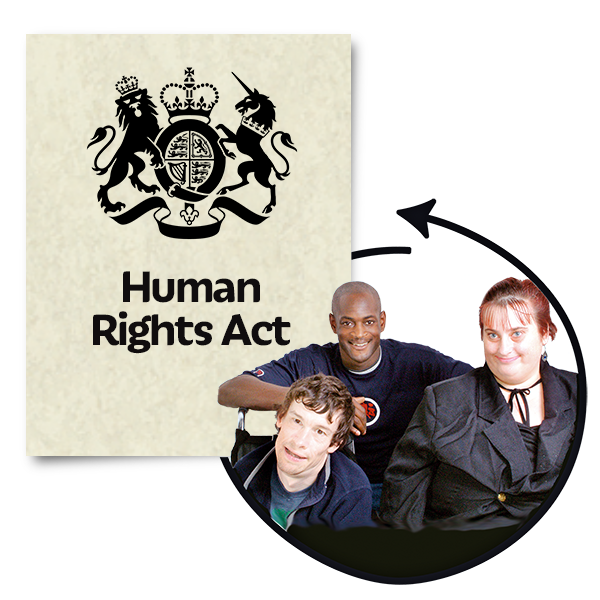The Government
 The Government are the people who run the country. The Government decide how much tax people should pay and how things like the National Health Service (NHS) should work.
has published its response to the Joint Committee on Human Right’s report on the treatment of people with a
learning disability
The Government are the people who run the country. The Government decide how much tax people should pay and how things like the National Health Service (NHS) should work.
has published its response to the Joint Committee on Human Right’s report on the treatment of people with a
learning disability
 A learning disability is to do with the way someone's brain works. It makes it harder for someone to learn, understand or do things.
and/or
autism
A learning disability is to do with the way someone's brain works. It makes it harder for someone to learn, understand or do things.
and/or
autism
 Autism is a disability. Autistic people find it difficult to understand what other people think and feel. They also find it difficult to tell people what they think and feel. Everyone with autism is different.
who are locked away in inpatient units.
Autism is a disability. Autistic people find it difficult to understand what other people think and feel. They also find it difficult to tell people what they think and feel. Everyone with autism is different.
who are locked away in inpatient units.
Mencap commented on the Government's response stating that it provides "little assurance that this domestic
human rights
 Human
rights
Human
rights
 Rights are the things everyone should be allowed to do like have a say, or go to school.
are the rights that everyone has. These include the right to go to school and the right to start a family.
scandal is being addressed with the urgency needed."
Rights are the things everyone should be allowed to do like have a say, or go to school.
are the rights that everyone has. These include the right to go to school and the right to start a family.
scandal is being addressed with the urgency needed."
Edel Harris, Chief Executive of the learning disability charity Mencap, said:
“The Government’s response to the Joint Committee on Human Rights report provides little assurance that this domestic human rights scandal is being addressed with the urgency needed. This week, we have seen further evidence of the shocking human rights abuses taking place in these institutions in a report by the Care Quality Commission.
“During lockdown, the Government missed its own target to reduce the number of people locked away in inpatient units for the second year running. Over 2000 people who have a learning disability and/or autism continue to be locked away in these hospitals. Yet we still do not have a clear timeline or action plan that’s desperately needed to drive forward the change we need to see on the ground.
“The Government must urgently plug the funding gap in its forthcoming spending review to stabilise the social care sector and develop the vital local support services people need, as well as deliver the cross-government strategy
A strategy is a plan to show what an organisation
An organisation are a group of people who work together. , or a person, wants to do and how they are going to do it. to drive forward the change required to truly transform our social care system. People have a right to live in their own homes, not hospitals.”
Read the Government’s “JCHR reports on the detention of young people with learning disabilities or autism: government response” here: https://www.gov.uk/government/publications/jchr-reports-on-the-detention-of-young-people-with-learning-disabilities-or-autism-government-response
- Ends –
For further information or to arrange interviews with a Mencap
spokesperson
 A spokesperson is someone who speaks up about something. They usually speak up on behalf of a group or organisation.
or
case study
A spokesperson is someone who speaks up about something. They usually speak up on behalf of a group or organisation.
or
case study
 A case study is a piece of writing that tells people more information about someone's experience.
, contact Mencap’s media team on:
A case study is a piece of writing that tells people more information about someone's experience.
, contact Mencap’s media team on:
- media@mencap.org.uk
- 020 7696 5414 (including out of hours).
Notes to editors:
About Mencap
There are 1.5 million people with a learning disability in the UK. Mencap works to support people with a learning disability, their families and carers by fighting to change laws, improve services and access to
education
 Education is when you learn things. When you fill in a form to get a job, education means you write where you went to school, college or university.
,
employment
Education is when you learn things. When you fill in a form to get a job, education means you write where you went to school, college or university.
,
employment
 Employment means having a job.
and
leisure
Employment means having a job.
and
leisure
 Leisure is when you have time to do things you enjoy like playing sports or going to the pub.
facilities. Mencap supports thousands of people with a learning disability to live their lives the way they want. www.mencap.org.uk.
Leisure is when you have time to do things you enjoy like playing sports or going to the pub.
facilities. Mencap supports thousands of people with a learning disability to live their lives the way they want. www.mencap.org.uk.
For advice and information about learning disability and Mencap services in your area, contact Mencap’s Freephone Learning Disability Helpline on 0808 808 1111 (9am-6pm, Monday-Friday) or email help@mencap.org.uk.
What is a learning disability?
- A learning disability is a reduced intellectual ability which can cause problems with everyday tasks – for example shopping and cooking, or travelling to new places – which affects someone for their whole life;
- Learning disability is NOT a mental illness or a learning difficulty, such as
dyslexia
 Dyslexia is a learning difficulty. People who have dyslexia can find it hard to read, write and spell.
. Very often the term ‘learning difficulty’ is wrongly used interchangeably with ‘learning disability’;
Dyslexia is a learning difficulty. People who have dyslexia can find it hard to read, write and spell.
. Very often the term ‘learning difficulty’ is wrongly used interchangeably with ‘learning disability’; - People with a learning disability can take longer to learn new things and may need support to develop new skills, understand difficult information and engage with other people. The level of support someone needs is different with every individual. For example, someone with a severe learning disability might need much more support with daily tasks than someone with a mild learning disability.